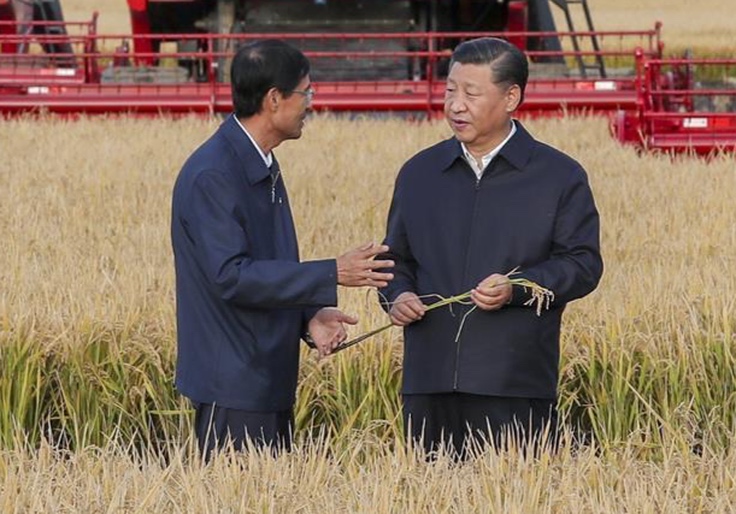China’s rush to purchase U.S. farmland and exert control over America’s food supply is a warning sign that Beijing is stockpiling resources in preparation for a war, the chairman of the House Select Committee on China told the Washington Free Beacon.
Beijing owns nearly 400,000 acres of land across America’s heartland and is currently the world’s largest importer of corn, soy beans, rice, wheat, and dairy products. "Food security" has emerged as a top concern for Chinese dictator Xi Jinping, and the CCP’s rush to buy prime American real estate is sounding alarm bells in Congress, according to Rep. Mike Gallagher (R., Wis.), chair of the House China committee.
"All of these things in my mind conspire to suggest he is preparing for potential war over Taiwan," Gallagher told the Free Beacon during an interview Thursday. "Some observers connect Xi Jinping’s newfound obsession with food security with his increasing aggression towards Taiwan, speculating that if the CCP precipitates conflict in the Strait, global seaborne trade will be disrupted, and therefore, securing grain supplies will be essential."
China’s increasing control over U.S. supply chains has emerged as a top priority for Gallagher’s committee, which will hold a roundtable Thursday in Dysart, Iowa, with local farmers to examine "the Chinese Communist Party's agricultural technology theft," according to a source close to the committee. The lawmakers will discuss the "impacts of the CCP’s malign tactics to undermine American agriculture," with a particular focus on Beijing’s $2 billion investment in American land.
"This is an existential threat to our farmers," Rep. Ashley Hinson (R., Iowa), a China committee member who will participate in the roundtable, told the Free Beacon. "When you look at what the Chinese have been trying to do strategically, it’s not just buying up farmland near military institutions, it’s buying up farmland through entities, so they can control our food and agriculture manufacturing supply. These are glaring vulnerabilities."
China is known to control around 384,000 acres of American farmland, according to statistics published in 2021 by the Department of Agriculture. Of those, 195,000 acres, worth around $2 billion, are controlled by 85 Chinese investors and companies. Another 189,000 acres are owned by American companies that partner with China.
But the investments could be much higher because American regulators have been "asleep at the wheel" for years, failing to perform proper oversight on these purchases, according to Gallagher.
The Committee on Foreign Investments in the United States (CFIUS), a regulatory body, was only recently granted the power by Congress to scrutinize these purchases. However, the body has claimed it has limited authority, leading Gallagher and a bipartisan group of lawmakers to propose legislation that would permit CFIUS to deny CCP land grabs near military bases and other sensitive American sites.
"I still don’t have the sense we know the full scope of what is happening," Gallagher said, noting that China’s United Front Works—a government body that pushes CCP ideology abroad—remains "a very poorly understood phenomena, even in the intelligence community."
China leverages its partnerships with American companies to obfuscate its role in the purchase of U.S. land, locations where Beijing often conducts surveillance operations on American soil. "I think that’s poorly understood and the scope is much greater than we appreciate," Gallagher said.
Hinson expressed similar concerns, saying that Chinese state-controlled entities "are trying to hide their malign intentions by masquerading as a legitimate business partner." Once they gain a foothold in America, these CCP entities "take our intellectual property from the American companies."
American farmland remains a top priority for China, with the FBI investigating a host of cases centered on CCP spies who have tried to steal U.S. trade secrets. Last year, for instance, a PRC national pled guilty to "conspiracy to commit economic espionage" and was sentenced to more than two years in prison for stealing software that helps farmers collect field data.
Both Gallagher and Hinson said the Biden administration is not taking the threat seriously.
"I’ve just seen no sense of urgency by the Biden administration and really no willingness to talk about it," Gallagher said. "That’s the bigger issue right now. There’s this renewed push for diplomatic and economic engagement with China and that’s having the practical effect of putting a wet blanket on all defensive actions we need to take to defend ourselves from the CCP’s ongoing economic and ideological war against America."
